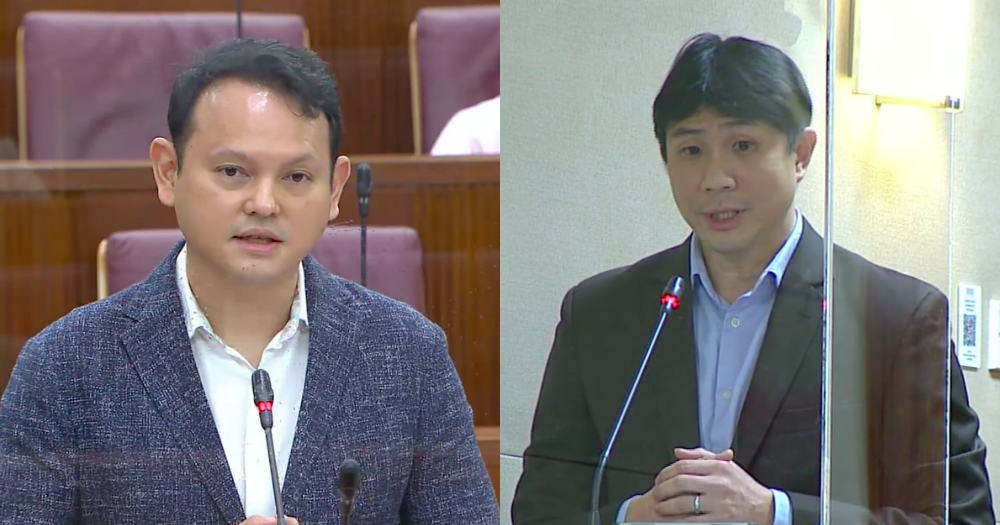The figure S$1,300 has been hotly debated and discussed in the past several months.
In Parliament on Tuesday (Nov. 3), Workers' Party (WP) Member of Parliament (MP) Jamus Lim asked how many Singaporeans earn S$1,300 or less per month in take-home wages, excluding employer and employee Central Provident Fund (CPF) contributions and other income deductions.
Senior Minister of State in the Ministry for Manpower (MOM) Zaqy Mohamad responded that there are currently 52,000 Singaporeans who receive less than S$1,300 per month, including CPF contributions and Workfare payouts.
This led to a back-and-forth between Lim and Zaqy, with Lim pushing Zaqy for a more specific answer, as his response did not answer Lim's question about take-home pay.
Zaqy, in turn, responded by questioning Lim on the Workers' Party's proposed minimum wage policy.
Definition of earnings include contributions to schemes
There are about 30,000 full-time Singaporean employees and 22,000 self-employed Singaporeans who earn less than S$1,300 per month including Workfare payouts and CPF contributions, said Zaqy.
These include office clerks, F&B workers, cleaners, shop salespeople, and other occupations, he added.
Zaqy explained that Singapore's approach toward defining personal income includes CPF contributions and Workfare payouts, as they can be used for necessities such as healthcare or housing.
This is "broadly aligned with" the International Labour Organisation's (ILO) definition of earnings, which includes employees' contributions to social security and pension schemes.
From 2007 to 2019, more than S$6.8 billion in Workfare payouts has been disbursed to 890,000 lower-wage workers, Zaqy said.
Lim asks again about take-home income
After Zaqy's answer, Lim repeated his question. He asked for a clarification about how many people receive a take-home income of S$1,300 and below, excluding the supplementary schemes.
In response, Zaqy reiterated his explanation for how the government understands personal income:
"I just want to reiterate the holistic understanding of Singapore's system — how we use personal income, including CPF and Workfare income payout [...] as these can be used for necessities.
Because [Workfare] gives you cash, and CPF, I think many of us use it for housing and healthcare."
Zaqy said that this definition is in line with international conventions like the ILO as well as those used by other countries' minimum wage systems.
Calculations to exclude CPF contributions would "require various other assumptions", he said.
He added that "it's worth to note" that 75 per cent of Workfare recipients own their own homes. "Therefore," he said, "there's a direct impact from CPF into your home ownership."
"So given this these considerations, it would not be meaningful nor accurate to consider income according to the parameters of the Member's query."
Zaqy asks Lim about minimum wage
Zaqy then asked Lim for a clarification on the WP's position on the minimum wage level it advocates.
He stated that, according to the WP's manifesto, it called for all working Singaporeans to receive a minimum take-home wage of S$1,300 per month for full-time work, and pro-rated for part-time work.
However, he noted, Lim suggested in September that there should be a national commission to determine the minimum wage level, and then in October said that the WP proposes a minimum wage of S$1,300.
"So, both these statements suggests a gross minimum wage of $1,300 per month. But Member Jamus Lim's current query seems to suggest that the Workers' Party is now proposing for minimum take-home pay of S$1,300. That's a shift in where the line is."
If this were the case, Zaqy said, that would mean that the gross wage, including CPF contributions, would need to be higher — around S$1,600 or S$1,700.
Jamus Lim: My question didn't specify minimum wage
Lim clarified that the premise of his question didn't specify anything about minimum wage.
Instead, Lim said, he asked his question about S$1,300 because that is how much a "reasonable basket of goods and services for adequate living in Singapore would entail."
Zaqy responded that he felt that Lim was "evading the question", and that the "root of the issue now" is that the WP changed its definition for the proposed minimum wage line.
Workers' Party has been clear: Lim
Lim responded that he didn't think that he was evading the question, but that Zaqy had made an inference about what Lim was asking which hadn't actually been asked.
"I think that the Workers' Party's position has been consistent, that is that it was about S$1,300 in terms of full-time work. But this particular question was about take-home pay in part because it is about what it means for survival in the case of Singapore."
Zaqy then asked Lim:
"Could I just confirm once again that the Workers' Party's S$1,300 minimum wage benchmark is gross income, so that we could settle this and come to an understanding?"
"Yes, that is a fair characterisation," replied Lim.
Totally unrelated but follow and listen to our podcast here
Top photos via CNA.
If you like what you read, follow us on Facebook, Instagram, Twitter and Telegram to get the latest updates.
